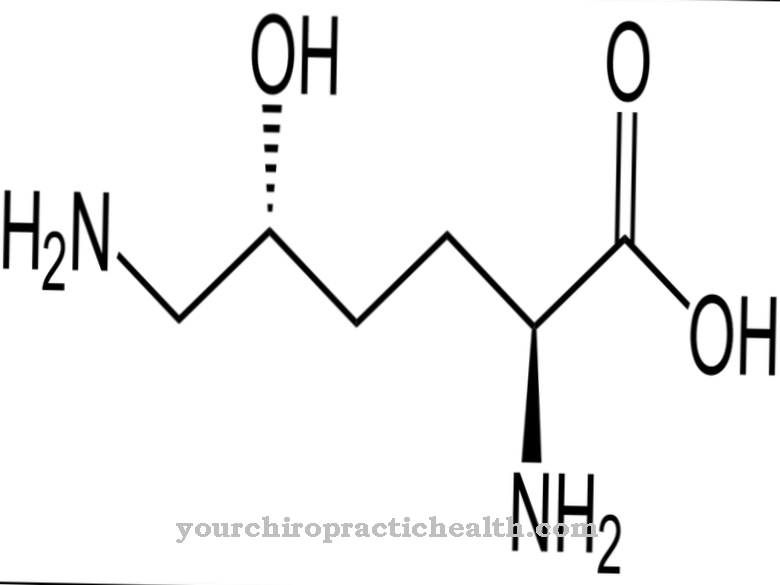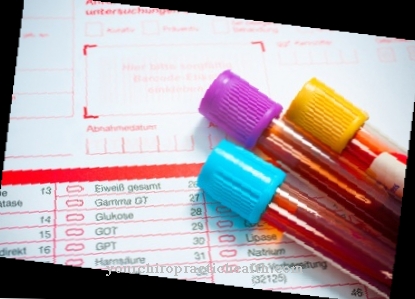When a pretty girl walks by, you can hear some admirers say: "That is my blood type!" Well, the likelihood that you have at least something in common with the beautiful stranger, namely the blood group, is not so small at first glance. There are only four blood groups, one of which must belong to the beautiful one. Why should it not be the same by chance, although the blood group equality or inequality does not include unconditional sympathy or antipathy.
Blood types

The blood groups A, B, AB and 0 have long been known to us, and everyone knows that they are e.g. must be determined beforehand in the case of blood transfusions, because not every blood “gets along” with everyone. Rather, serious complications can arise from the transfer of unsuitable blood.
Everyone is also aware that e.g. In the case of paternity proceedings, the forensic doctors, in addition to a DNA test, determine the blood group affiliation and, in favorable cases, can safely rule out a contested paternity with their determination alone. These “favorable” cases exist when the father belongs to a different blood group than the mother and the child belongs to a different blood group.
Unfortunately, these clear cases are quite rare, a finding that can easily be explained with the small number of only four different blood groups, which are not evenly distributed among humanity. In all the many cases, however, in which mother, child and alleged father belong to the same blood group, paternity cannot simply be assigned to them.
Rh factor Rh factor
Scientific research started looking for further distinguishing features and discovered, among other things, the blood subgroups or blood factors m and n. However, they play an increasingly rare role in forensic medicine. Scientific research into blood group properties has now become an almost independent branch of medicine. In animal experiments with the blood of rhesus monkeys, the Americans Landsteiner and Wiener discovered another blood factor in the last century, which, as later turned out, is also present in human blood. Since it was first found in experiments with rhesus monkeys, it was called the Rh factor.
It was recognized that he was responsible for some types of incidents involving transfers of blood of the same group.About 15% of all people lack this Rh factor in their blood. They are rh negative. One can easily transfer the blood of Rh-positive people to such Rh-negative people, there are no complications during the blood transfusion. In the body of the rh-negative person, however, defense substances (antibodies) against the rh-positive blood are then formed.
If rh-positive blood is transferred again, these antibodies come into effect and cause damage to the transferred blood and to the patient's own blood, thus causing a transfusion incident that may be fatal. Such antibodies are also formed in the body of a rh-negative mother who has given birth to a rh-positive child. Such a mother is only allowed to receive rh-negative blood if a blood transfusion becomes necessary later, otherwise her life is in serious danger.
Rh factor & pregnancy
If a rh-negative mother who has a completely healthy child from her rh-positive husband (the antibodies were only formed during the first pregnancy or during childbirth), pregnancy occurs a second or more times, including a Miscarriage is just as important as pregnancy, this time the antibodies that are formed are directed against the health of the expectant child, who is either born prematurely, often dead, or with severe health disorders that may make it unable to live.
The same can happen if the rh-negative mother already received a blood transfusion before the first pregnancy, whereby the donor blood contained the Rh factor. Under these circumstances, the antibodies formed in the mother's blood are already effective in the first child, which comes from a rh-positive man, and are directed against the life of the future child.
Rh factor prevention & treatment
Medicine, of course, did not stop at the discovery of the Rh factor and its effects, but has tried successfully to banish all impending dangers. If it is a blood transfusion, it is relatively easy. Every doctor has the duty to determine not only the blood type but also the Rh factor before the blood transfer. In this way the dangers of unsuitable blood transfer are avoided.
However, it is difficult to find a Rh-negative woman who already carries the antibodies against Rh-positive blood (e.g. through previous blood transfer with Rh-positive blood or through a previous pregnancy with Rh-positive child), before the threatened premature birth or to preserve the birth of a non-viable child.
During pregnancy counseling, a blood sample is taken from every woman in the 4th month, which includes is also examined for the presence of the Rh factor. If this factor is missing, blood check-ups are carried out at regular intervals in the case of repeated pregnancies or previous blood transfusions, which provide the doctor with information about the presence or strength of the antibodies against Rh-positive blood (at the end of the pregnancy the resistance is strongest).
The child's life can be saved by immediate blood exchange, in which all of the baby's blood is replaced with blood from an appropriate donor. Every minute is precious here. It goes without saying that rh-negative women should deliver in a hospital. Fortunately, the described complications do not occur in all rh-negative mothers. This is due to the fact that not all rh-negative people develop equally strong defenses against Rh-positive blood.
The dangers described here occur only in a small fraction of the cases. The knowledge of these things, however, made many a stroke of fate that affected our families understandable. Today, thanks to the preventive health measures in Germany, we can avoid such complications, at least if the expectant mother has consulted her gynecologist for pregnancy advice in good time and the necessary measures are taken there.






.jpg)




















